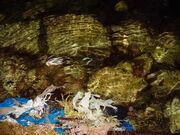By Jodi Lee

A legacy that will destroy the planet.
It was touted as the solution to the homemaker’s drudgery. A way to ease the burden of mealtimes, dishes, the convenience of the modern world. Throw away plastic. Disposable plates, cutlery, containers, bags, bottles. Quick and easy. Never have to clean again, just toss it out. Quick and easy has come at a terribly high price. By now, I’m sure you know to recycle your plastic milk jugs, yogurt containers, and water bottles. But consumer plastic recycling is still very low, only 4% of plastic sees the inside of a blue bin. Plastics have infiltrated the world but it goes well beyond our fridges. Our oceans, lakes, and rivers are infested. Why does this matter? Our marine life mistake the colorful floaty bits for food. Fish, turtles and other sea creatures get tangled in the handles of shopping bags, suffocate when stuck inside a container, choke on a plastic ring, poison themselves and die of malnutrition with stomachs filled with bottle tops. Plastics do not biodegrade. Ever.
Our oceans are dynamic systems, made up of complex networks of currents that circulate water around the world. These systems along with wind and the earth’s rotation create “gyres”, huge, slow rotating whirlpools where plastic garbage can accumulate. In the Central North Pacific Gyre, pieces of plastic outweigh surface zooplankton by a factor of 6 to 1. Marine life rely on plankton as their food source - their diets are now heavily influenced by our use of disposable plastics. The plastics release chemical additives and plasticizers into the water and also adsorbs pollutants like PCBs and pesticides like DDT which end up in the foods we eat. Our addiction to throw away plastics is not only harming the environment but is also poisoning ourselves. Capt Charles Moore explains this serious environmental issue in this video.: http://www.ted.com/talks/capt_charles_moore_on_the_seas_of_plastic
How can we reduce our ecological footprint? Here are five ways to save our waterways.
1. Get a reusable steel water bottle and swear off buying water bottled in plastic bottles.
2. Use cloth shopping bags and refuse the plastic ones.
3. If you must buy something in a plastic container, but the biggest one available. This reduces your frequency of buying another container.
4. If you have a choice, buy the product in glass or metal.
5. Avoid plastic wrap. We can no longer ignore the destruction that is plastic. Our lives depend on it. For more ways to save the planet and reduce your ecological footprint, take the free assessment at Going Green Today.
